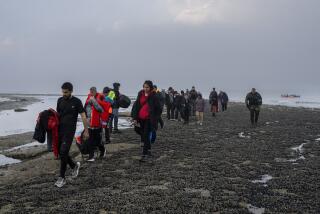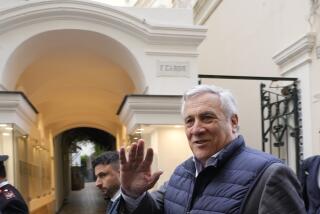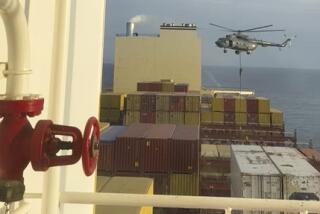A paper tiger?
- Share via
LAST WEEK, while the European Union celebrated 50 years of peace, freedom and solidarity, 15 Europeans were kidnapped from Iraqi waters by the Iranian Revolutionary Guard. As I write, those 14 European men and one European woman have been held at an undisclosed location for nearly a week, interrogated, denied consular access but shown on Iranian television, with one of them making a staged “confession.” So if Europe is as it claims to be, what’s it going to do about it? Where’s the solidarity? Where’s the action?
Simply to describe the crisis in these terms is to see how far we are from the Europe of instinctive solidarity that European leaders like to believe we have -- and especially when it comes to armed forces abroad. Most Brits do not think of the captured sailors and marines as Europeans. They will look for more decisive action from the British government and then perhaps from the United States or the United Nations. It would not occur to them to look across the Channel for support, and they would be surprised to learn that Europe has more direct, immediate leverage on Iran than the U.S. does.
Many continental Europeans, if they have registered that there is a crisis at all -- and many will not have, because Europe’s media are still mainly national in form and priorities -- will probably think of it as yet another consequence of a foolish, illegitimate Anglo-American military action in Iraq. They will see it as a problem for “them” (Britons and Americans) rather than for “us” (right-thinking, peace-loving Europeans).
Those who follow these things more closely may wonder if the Revolutionary Guard was not making an indirect tit-for-tat response to U.S. seizures of Iranians in Iraq, perhaps hoping for a hostage swap. Or perhaps it’s an angry reaction to the U.N. Security Council resolution extending sanctions against Iran over its nuclear program, which was passed a day after the kidnapping (its contents were well known beforehand). But I bet my bottom euro that none of these continental Europeans’ synapses will have fired spontaneously with this thought: “Our fellow Europeans have been kidnapped, so what can we, as Europe, do in response?”
Even if you regard the Anglo-American presence in Iraq as foolish and illegitimate, and the American seizure of Iranians in Iraq as an escalation of this folly, that would not excuse the Iranian action. The British troops were operating as part of a multinational force under U.N. mandate to protect oil installations and prevent the smuggling of guns into Iraq. According to GPS instruments that the British personnel had with them, they were nearly two miles inside Iraqi territorial waters when they went to search a suspect vessel. In fact, the first coordinates for the allegedly transgressing British boats given to the British on Sunday by the Iranian government turned out to be within Iraqi territorial waters too. Not until Tuesday did the Iranians come up with a “corrected” set of coordinates that conveniently put the British forces on the wrong side of the line.
THE BRITISH government initially tried to secure the captives’ release by what Foreign Secretary Margaret Beckett described as “private but robust diplomacy,” while also aiming to bring indirect pressure to bear on the Iranian government. Among the protests was a statement of condemnation from the presidency of the EU -- currently held by Germany -- conveyed to the Iranian government.
Let us hope that, by the time you read this, all the British captives are free. If they are not -- and in any case, for a possible next time -- we need to think about next steps. Although Javier Solana, the nearest thing the EU has to a foreign minister, did raise the issue with Iran’s chief nuclear negotiator, it’s a bad idea to link the reopening of nuclear talks to the kidnapping issue. Iranian hard-liners would be delighted to scupper those talks. Why walk into their trap?
But there is something Europe should do: flex its economic muscles. The EU is by far Iran’s biggest trading partner -- more than 40% of Iran’s imports and more than a quarter of its exports are with the EU. Remarkably, this trade has grown strongly in the last years of looming crisis. Much of it is underpinned by export credit guarantees given by European governments, notably those of Germany, France and Italy. According to the most recent figures available from the German economics ministry, Iran is Germany’s third-largest beneficiary of export credit guarantees, outdone only by Russia and China. Iran comes second to none in terms of the proportion of German exports -- up to 65% -- underwritten by the German government. As the squeeze grows on Iran from U.N. sanctions, and as Iranian President Mahmoud Ahmadinejad fails to deliver on his populist economic promises, this European trade becomes ever more vital for the Iranian regime.
In the House of Commons earlier this week, a former foreign secretary, Sir Malcolm Rifkind, asked if Britain’s European friends, and Germany, France and Italy in particular, might be prevailed on to convey to Iran, perhaps privately in the first instance, the possibility that such export credit guarantees would be temporarily suspended until the kidnapped Europeans are freed. I gather that if such private pressure is not forthcoming, Britain might be tempted to raise the suggestion more formally at a meeting of European foreign ministers in Bremen this weekend.
So here’s a challenge for the German presidency of the EU. Will you put your money where your mouth is? Or are all your Sunday speeches about European solidarity in the cause of peace and freedom not even worth the paper they are written on?
More to Read
Sign up for Essential California
The most important California stories and recommendations in your inbox every morning.
You may occasionally receive promotional content from the Los Angeles Times.










